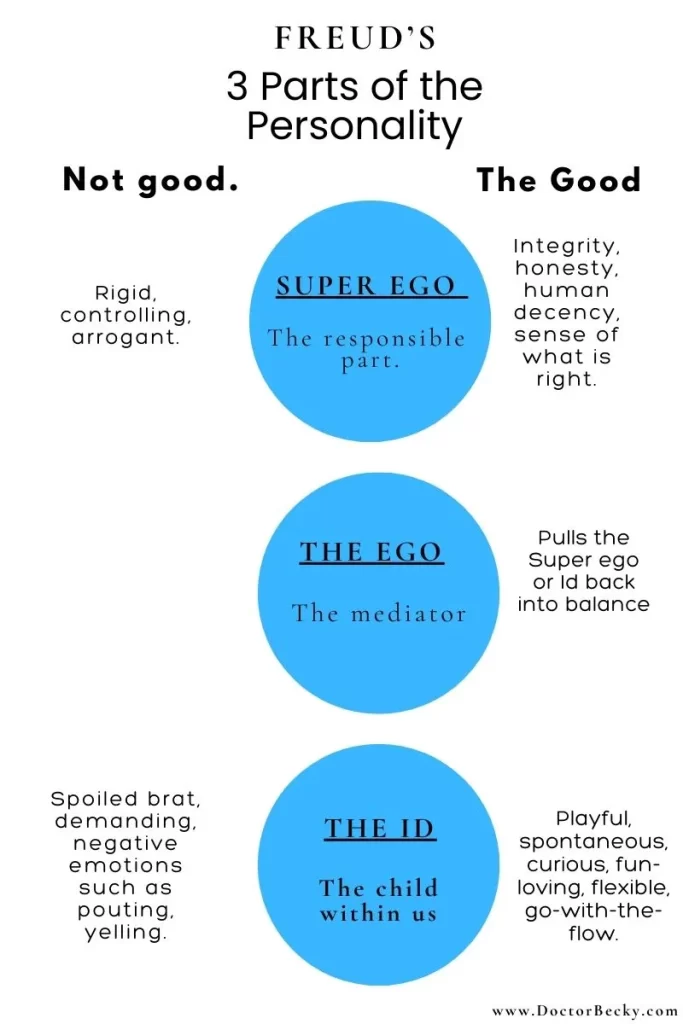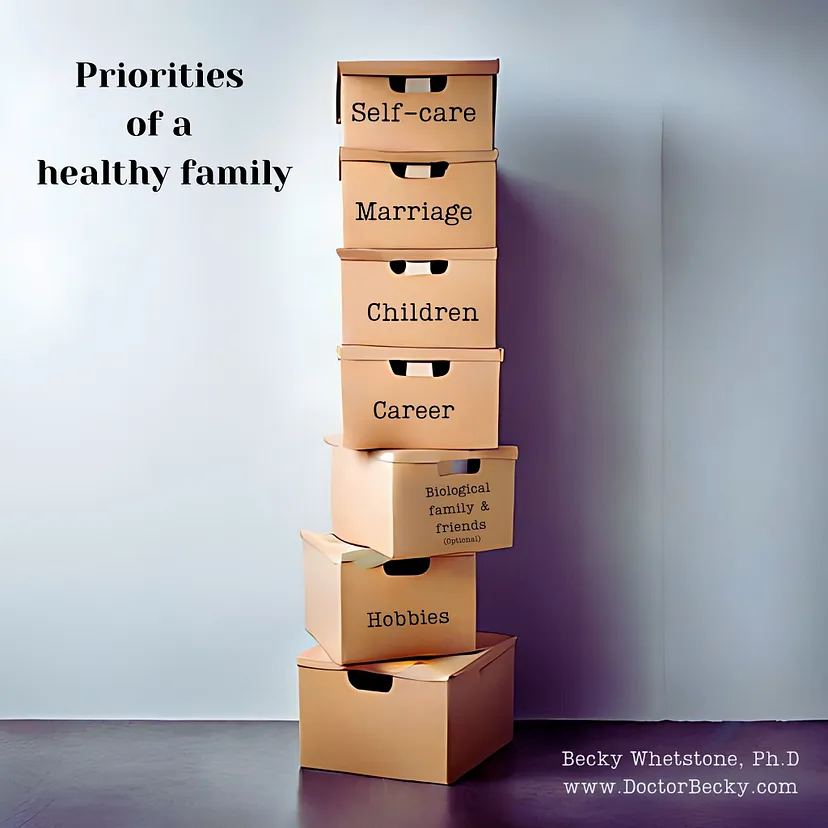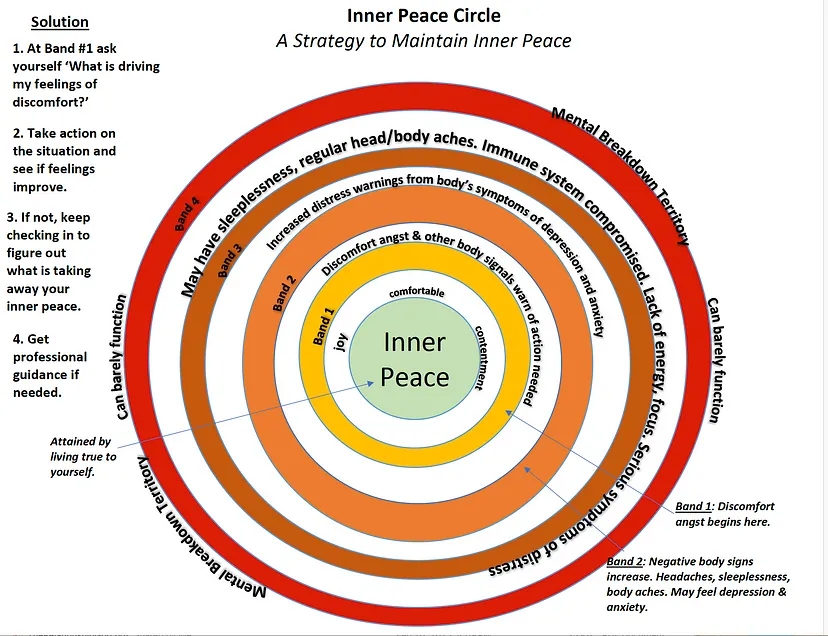Getting to know the different parts of your personality is fascinating and can help you become healthier and happier. Graphic: Adobe Stock/agsandrew
One of the things that has helped me understand people, personal relationships, and why we all do what we do is learning that we all have different parts within our personalities. I think of it as several people that talk to me in my head; I listen as each attempts to elbow its way into consideration and influence me to do what it wants. All of us experience this phenomenon, and it’s not to be confused with schizophrenia, where people say they “see and hear voices.”
The voices we hear are different parts of us, wanting different things. Some may be dysfunctional and lead us to do self-destructive things; others attempt to lead us to health and happiness, and still, others try to protect us from being hurt. Then there’s everything else in between. Overachieving and ambitious Becky wants to get some more writing done; the leisurely and fun-loving part of Becky wants to nap and then watch Netflix. My most responsible self wants me to prepare taxes. Who will get me to take the actionable steps they most want? How do I manage the voices and decide which one to listen to?
Getting clients to become aware of the different parts of themselves that are vying for their attention is fascinating, and they love it. As we identify their various parts, I ask them to visualize and name them. When we get to know these parts, we can better see the ones that lift us up and take us down, and self-awareness changes everything. Whereas the worst part of me would be under the surface, occasionally urging me to do self-sabotaging things, now that I have pulled her up out of the basement and into the light, I know who she is, what she wants, and when she’s likely to work to get my attention.
It started with Freud.
Sigmund Freud was the first to say humans had three parts to their personality. He named the three parts the Super-ego, the Ego, and the ID. Below, I have made a graphic to help clients understand how the different parts play out …

Freud’s three parts of the personality. Two of them have a positive and a negative side. The trick of life is staying on the positive side, with each part in balance. Graphic: Becky Whetstone, Ph.D.
The three parts.
Think of each part as a voice that speaks to you in your head. Here is how that might sound when it’s doing what it’s supposed to do:
Superego: I’ve got to get this project finished this weekend.
Ego: Yes, that’d be great, but you are exhausted and need to take a break. You don’t have to do it all this weekend, it’s not urgent. Your children and wife want to spend time with you.
Id: Yeah, I hoped to go to the lake, sit outside, and play with the kids. Maybe I will go ahead and do that. That sounds really nice.
In a healthy person, all three circles are balanced. The Super-ego and ID must get their needs met enough to be satiated, and if they don’t, a person’s personality is likely to switch over to the negative side of the three circles. This is when our worst selves show up and do damage to ourselves and others. Ideally, you should be able to sense or feel when you are working or playing too much and then respond when your ego tells you to pull back.
This is NOT Multiple Personality Disorder (MPD).
When I do this work with people, they often ask if they have MPD. First, they don’t call it that anymore; today, the diagnosis is known as Dissociative Identity Disorder (DID). In this very serious and incurable disorder, the parts of the personality are not aware of one another. So if I am being Suzy, the good little girl, and switch over to Nasty Nancy, neither one has any idea the other exists.
The rest of us have our different parts that Freud named; each one is aware of the other, and each part has offshoots. My husband has a part I call Sargeant Cheairs (pronounced Chairs). Sgt Cheairs comes from his Super-ego and is very vigilant about safety and hazard precautions. He makes sure things are locked down and unplugged, patrols for dangers, and hates riding in cars when others are driving (they hate it, too, because he points out every potential mistake, problem, or potential hazard along the way.) I can tell when my husband’s usual self is in the room and when it’s Sargeant Cheairs. They have different energy, carry themselves differently, and even have different facial expressions.
I could let Sargeant Cheairs drive me nuts, but turning him into a character we can talk about has made this issue become something that amuses us both to no end. He embraces the character and has even started talking in a British accent when he finds hazards and unlocked doors, signaling the arrival of you-know-who. We both imagine him in an Army uniform, making sure everything in the house is perfect. If we didn’t have so much fun with it, it would have the potential to lower the stock of our marriage, and that’s what I want to point out to you. If you have an annoying part of your personality, create a persona around it, give the part a name, imagine what it looks like, and talk and laugh about it. Every human relationship needs a solid sense of humor about one another’s quirks and eccentricities to keep from going mad.
What Carl Jung said.
Carl Jung (1) worked with Freud but later branched off and developed his own ideas about the personality, broadening our understanding. He said there were four archetypes that form our personalities: the persona, the shadow, the anima/animus, and the self, and we can better understand ourselves by understanding them. Jungian therapy is still popular today, and I use it all the time in my practice with hypnosis, analyzing dreams, and helping clients pinpoint archetypes like Sargeant Cheairs.
I’m not going to share everything about Jung’s complicated theory of the personality, but I do think it’s worthwhile to point out the four archetypes:
1. The Persona. The false face or mask we show to the world. We all learn to conform in childhood and end up playing roles of who we think we ought to be based on what our parents, peers, and other influencers want us to be. The most common ones I see are pleasers, perfectionists, overachievers, rebels, rescuers, fixers, martyrs, caretakers … and none of these reveal who we really are. The majority of people spend their entire lives in their persona, which is sad because it has nothing to do with who you really are.
2. The Anima/Animus. Experienced unconsciously, whatever gender you identify with, the anima/animus part of your personality is the opposite of that. It is the male part of me, for example. All of us are a combination of male and female traits, though some (needlessly) feel threatened by the idea. I am in the male part of my personality when I am working, having to be confident and decisive. I am in my female energy when I am being soft, nurturing, and vulnerable. There is a lot more to this, worthy of another blog, but for now, understand we all have traits of both genders within us. One reason it’s important to understand male and female energy within us is because it directly affects the romantic and sexual chemistry between two people. For example, if I have a female client who is hard and managerial like a man, she will not have sexual chemistry with her husband, who is also that way. We need the polar energies for romantic and sexual chemistry.
3. The Shadow. The part of us we reject, disown, or don’t recognize. Jung described this as the opposite of our persona … it is more authentic and wants to hold you accountable to being true to yourself. Sometimes it does that in self-destructive ways. It also projects our disowned or unrecognized traits onto others. I have seen the shadow do some crazy and dangerous things to force a client to be true to themself, which could have been prevented if a client could learn to come out of their persona and act authentically. Trust me, being true to yourself is the only path to mental and emotional health.
4. The Self. This is us as we really are. It unifies all the different types and personalities within us without covering up or hiding any of them. A healthy self can be itself, warts and all. One issue I see frequently is that a client has decided subconsciously that they must be seen by others as good and perfect — this would be an issue from the persona.
If a persona must be seen as perfect, it will never allow you to admit fault in any situation, which is not conducive to healthy relationships. The self can admit fault and understand we humans are all imperfect, weird, and mistake-makers, and it’s okay with that. I encourage everyone to embrace this idea.
Why it’s important to understand our different selves.
Numerous theories of counseling have incorporated our different selves in understanding who we are and why we do what we do. Each one is a little different, and most are very helpful. It’s an important first step to identify the different voices and understand their agenda.
I often tell clients that my family was obsessed with eating when I was a child, and we’d go to an all-you-can-eat buffet and load up our plates. (My dad believed in eating, not dining.) Dad would inspect our plates and beg us to pile them higher and eat more. If we didn’t do it ourselves, he’d bring some himself and throw it on our plate, whether we wanted it or not. For the longest time, I thought feeling nauseated after a meal was normal. On the other hand, my family was fat-phobic and would talk about the status of everyone’s weight when they weren’t around.
Later in life, I realized I had two different parts that represented these dysfunctional family traits. I envisioned Ursula the Sea Witch from Little Mermaid on one end of the couch, saying in her gravelly voice, “When are we going to eat?” and a smoking, skeletal female on the other end waving her cig at me and saying, “Don’t get fat.” Once I was able to identify those terribly dysfunctional voices, their under-the-radar influence in my life was done. I decided to listen to my self, which was healthy and balanced Becky, who sits between the two and is determined to eat when hungry and in moderation. That’s a win.
An exercise to discover some of your voices.
Here are some of the most common voices that my clients have … see if you have any of them, and if you do, visualize them, then try to figure out where they came from. For example, I know the food and fat-obsessed voices I had came from my family’s weird eat-tons-but-don’t-get-fat dynamic. Realizing these things kills these negative voices’ power over you moving forward.
- The taskmaster. Has endless lists of things you need to get done and does not like you to sit still.
- The critic or judge. Constantly critiques everything you do, how you do it, and maybe even how you look.
- The protector. The part of you that defends and protects you, puts out personal fires.
- The controller. Wants things their way. Will manipulate to get it done.
- The martyr. You bloody yourself to please others.
- The victim. It’s never your fault.
- Ambitious egomaniac. Claws to attain significance.
- The addict. The part of you that does whatever it is, too much, and will not be stopped.
- Nasty teen. A sassy or nasty teenager who loves telling people off and having the last word.
- The impulsive one. I want it, and I want it now.
There are a lot more, but hopefully, you understand what I’m saying here. Get to know the voices and their purpose for being in your head, and take the dysfunctional voice and get that need met in a functional way. For example, I don’t need Ursula the Sea Witch to remind me to eat, and I don’t need the skeletal smoker to warn me about getting fat. I have my healthy self, who can manage both of these things in a way that is balanced and compassionate.
(1) https://www.simplypsychology.org/carl-jung.html
Becky Whetstone, Ph.D., is a licensed Marriage and Family Therapist in Arkansas and Texas* and is known as America’s Marriage Crisis Manager®. She is a former features writer and columnist for the San Antonio Express-News and has worked with thousands of couples to save their marriages. She can work with you, too, as a life coach if you’re not in Texas or Arkansas. She is also co-host of the Call Your Mother Relationship Show on YouTube and has a telehealth private practice as a therapist and life coach via Zoom. To contact her, check out www.DoctorBecky.com and www.MarriageCrisisManager.com. Also, here is how to find her work on Huffington Post. Don’t forget to follow her on Medium so you don’t miss a thing!
For licensure verification, find Becky Whetstone Cheairs.








 Becky Whetstone is an Arkansas native and has a Ph.D. in Marriage and Family Therapy from St. Mary’s University in San Antonio, Texas. She is a Licensed Marriage and Family Therapist (LMFT) in Texas and Arkansas.
Becky Whetstone is an Arkansas native and has a Ph.D. in Marriage and Family Therapy from St. Mary’s University in San Antonio, Texas. She is a Licensed Marriage and Family Therapist (LMFT) in Texas and Arkansas. 

















































































































